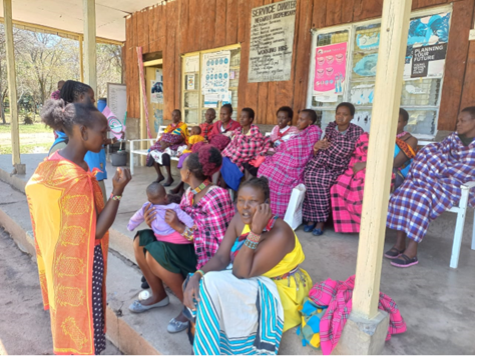Dreams Rekindled: Aspiring Teacher Finds Hope Through Reproductive Health Outreach
September 11, 2024
Dreams Rekindled: Aspiring Teacher Finds Hope Through Reproductive Health Outreach
In the heart of Nkareta village in Kenya’s Narok county, Kuyioni Mpusia — a determined young woman — nurtured her dream of becoming a teacher. However, at the age of 16 and in only her second year at the Nkareta Secondary School, her aspirations were halted when an unexpected pregnancy forced her to leave school, Kuyioni encountered challenges in accessing essential maternal and reproductive healthcare services; the nearest facility, located fifteen (15) kilometers away, stigma at the community and high transport costs to the nearest health facility.
In Narok county, the adolescent birth rate for girls aged 15-19 years is 225 births per 1,000 girls and of women aged 20-49, 63.8% married and became mothers during their childhoods.[1] A study carried out in the neighbouring county of Kajiado reported that the key contributing factors of teenage pregnancies included: normalization of teenage pregnancies in the community, early girls’ sexual debut (9-10 years) especially after Female Genital Mutilation (FGM), and lack of ability to support their basic needs like sanitary towels which leads many girls to looking for support from men who take advantage and ask for sexual favours.[2] According to the 2022 Kenya Demographic Health Survey Narok County has a 56.3% literacy rate with only 0.4% holding a university level certificate and 8.9% having completed secondary education, notably lower than the national average of 66.4%.[3],

Teen mothers sharing and receiving FP and MH information in reach at Megwara dispensary.
Compounded by the prevalence of FGM leading to early marriages and teenage pregnancies, the landscape for young women striving for an education and a brighter future is littered with obstacles. Kuyioni’s story mirrors the struggles of many teenage mothers in Narok County, grappling with limited access to family planning, reproductive, and maternal health services.
Initiatives like NPI EXPAND, in collaboration with HealthRight Kenya (HRK) and Kenya’s Ministry of Health with funding from USAID, were working to increase gender equality and educational outcomes. NPI EXPAND aimed to improve access to sexual and reproductive health information and services. As part of the program, community health volunteers conducted household visits, health facility in-reaches where specific community groups like teenage mothers are encouraged to visit the health facility for services, delivering crucial health messages, particularly emphasizing the significance of family planning. This grassroots approach proved pivotal in garnering community trust and commitment. The program also engaged community elders in male dialogue forums, gradually fostering greater acceptance of family planning services.
Four months after giving birth at home with the support of a Traditional Birth Attendant (TBA), Kuyioni and her baby had not had an opportunity to access health services. During the regular outreach activities that were being supported by the project, Kuyioni had a chance to interact with the health care workers and she received health advice and counseling. Kuyioni was determined to return to school and pursue her dream of becoming a teacher and opted to take a family planning method, the implant—a long-acting reversible contraceptive that lasts for three years—symbolizing Kuyioni’s courageous step toward finishing her education and a brighter future. Kuyoini could not do this alone without the support of her mother to take care of the baby while she returned to school and her father who agreed not to marry her off at that young age. Kuyoini’s mother and father were beneficiaries of both women and male engagement groups that had been sensitized by the project and were in support of teenage mothers continuing with education post-delivery.
Expressing gratitude to the outreach program for bringing essential services closer to her community, Kuyioni emphasized the transformative impact on those, like her, who had felt isolated and overwhelmed. “The counseling has given me a second chance in life to continue with my education. I hope to become a teacher one day,” remarked Kuyioni.
Kuyioni’s journey stands as a testament to the transformative power of collaboration between implementing partners, Narok County Health department and community engagement in addressing the access to reproductive health service to marginalized groups.
“While reproductive health services outreach activities have a direct impact on maternal and child health, they also have the potential to break down barriers and re-open the doors of education for young girls, reviving the chance to achieve their long-term goals.” Josephine Mbiyu- Country Team Lead NPI EXPAND Kenya Activity, 2024.
[1] The State of Kenya population report 2020 – ICPD25
[2] Olenja J, Krugu JK, Kwaak v.d. A, Kawai D, Karanja S, Apanja M, et al., (2019). Factors influencing teenage pregnancy among Maasai girls in Kajiado West Sub-County, Kenya. An operational qualitative study report as part of the YES, I DO programme implemented from 2016 to 2020.
[3] KNBS and ICF. 2023. Kenya Demographic and Health Survey 2022. Nairobi, Kenya.